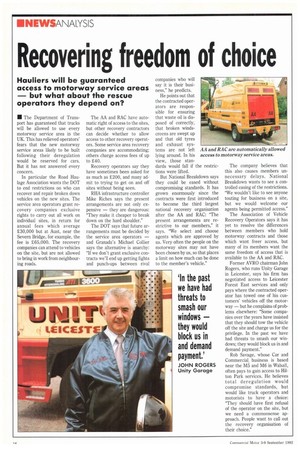Recovering freedom of choice
Page 18

If you've noticed an error in this article please click here to report it so we can fix it.
Hauliers will be guaranteed access to motorway service areas but what about the rescue operators they depend on?
• The Department of Transport has guaranteed that trucks will be allowed to use every motorway service area in the UK. This has relieved operators' fears that the new motorway service areas likely to be built following their deregulation would be reserved for cars. But it has not answered every concern.
In particular the Road Haulage Association wants the DOT to end restrictions on who can recover and repair broken down vehicles on the new sites. The service area operators grant recovery companies exclusive rights to carry out all work on individual sites, in return for annual fees which average 2.30,000 but at Aust, near the Severn Bridge, for example, the fee is £65,000. The recovery companies can attend to vehicles on the site, but are not allowed to bring in work from neighbouring roads. The AA and RAC have automatic right of access to the sites, but other recovery contractors can decide whether to allow access to other recovery operators. Some service area recovery companies are accommodating; others charge access fees of up to £40.
Recovery operators say they have sometimes been asked for as much as £200, and many admit to trying to get on and off sites without being seen.
RHA infrastructure controller Mike Riches says the present arrangements are not only expensive — they are dangerous: "They make it cheaper to break down on the hard shoulder."
The DOT says that future arrangements must be decided by the service area operators — and Granada's Michael Collier says the alternative is anarchy: "If we don't grant exclusive contracts we'll end up getting fights and punch-ups between rival companies who will say it is their business," he predicts.
He points out that the contracted operators are responsible for ensuring that waste oil is disposed of correctly, that broken windscreens are swept up and that old tyres and exhaust systems are not left lying around. In his view, those standards would fall if the restrictions were lifted.
But National Breakdown says they could be eased without compromising standards. It has grown enormously since the contracts were first introduced to become the third largest national recovery organisation after the AA and RAC: "The present arrangements are restrictive to our members," it says. "We select and choose agents which are approved by us. Very often the people on the motorway sites may not have been chosen by us, so that places a limit on how much can be done to the member's vehicle." The company believes that this also causes members unnecessary delays. National Breakdown wants to see a controlled easing of the restrictions. "We wouldn't like to see anyone touting for business on a site, but we would welcome our agents being permitted access."
The Association of Vehicle Recovery Operators says it has yet to resolve the differences between members who hold motorway contracts and those which want freer access, but many of its members want the same freedom of access that is available to the AA and RAC.
Former AVRO chairman John Rogers, who runs Unity Garage in Leicester, says his firm has negotiated access to Leicester Forest East services and only pays where the contracted operator has towed one of his customers' vehicles off the motorway — but he complains of problems elsewhere: "Some companies over the years have insisted that they should tow the vehicle off the site and charge us for the privilege. In the past we have had threats to smash our windows; they would block us in and demand payment."
Rob Savage, whose Car and Commercial, business is based near the M5 and M6 in Walsall, often pays to gain access to Hilton Park services. He believes total deregulation would compromise standards, but would like truck operators and motorists to have a choice: "They should have first refusal of the operator on the site, but we need a commonsense approach. People want to call out the recovery organisation of their choice."




































































































